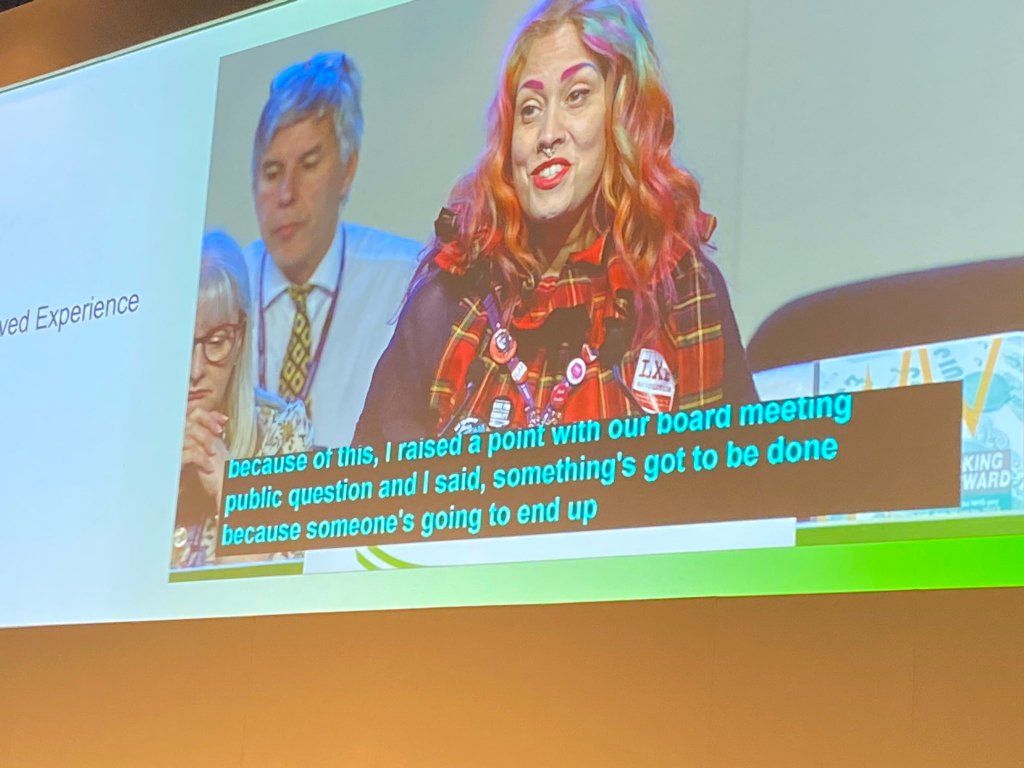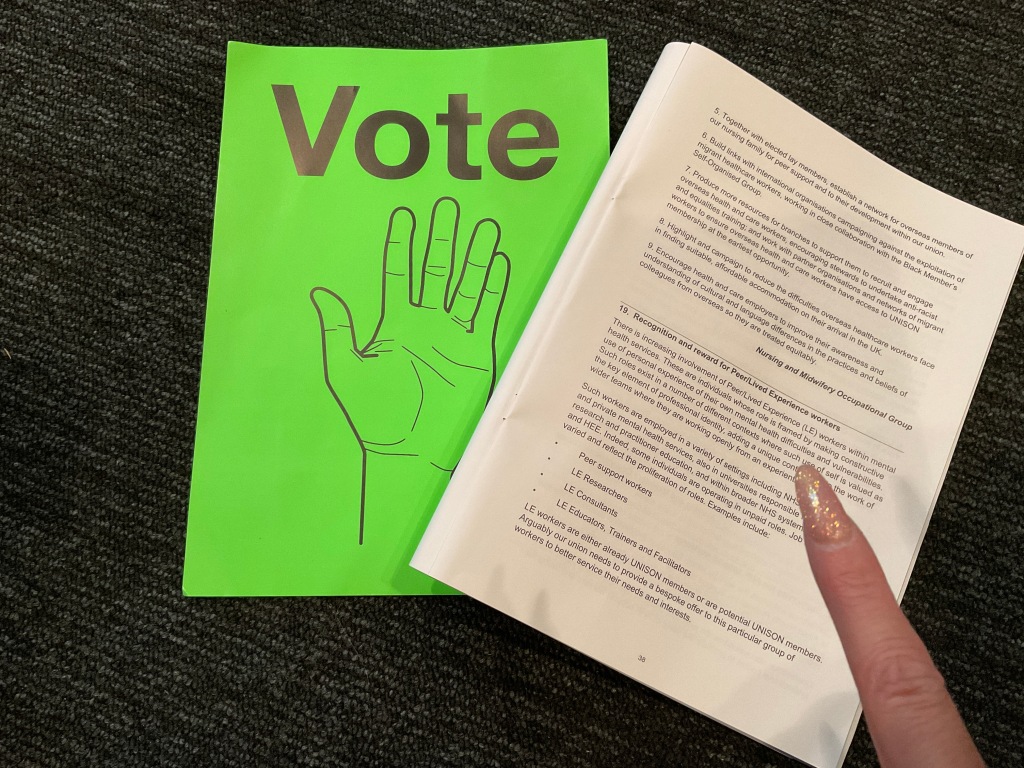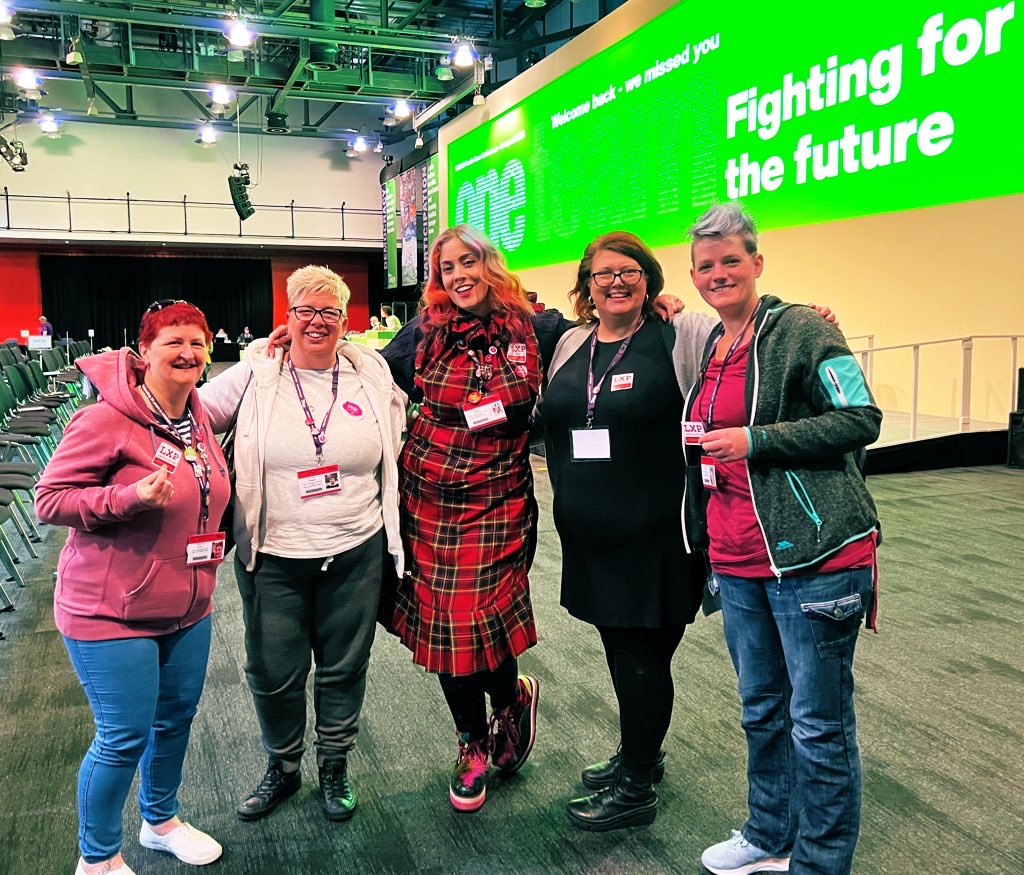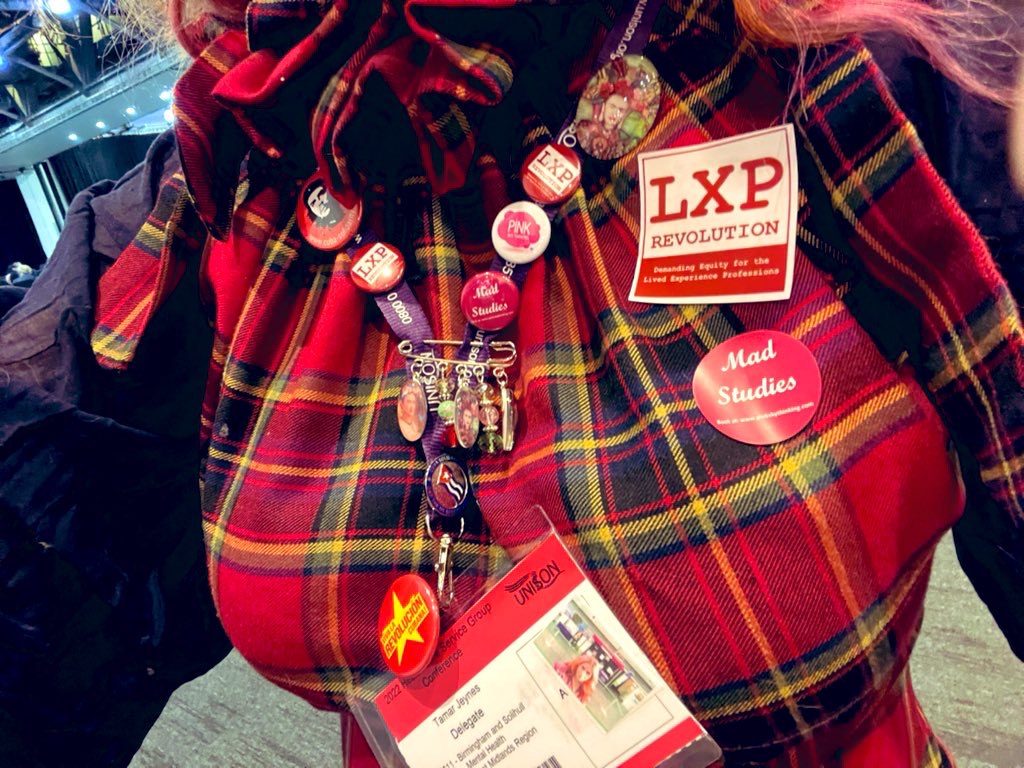
Correspondence by Tamar Jeynes, Unison Health Conference Delegate (2022)
The first ever motion by a union to supporting Lived Experience Professional (LXP) workers was proposed and unanimously voted in by members of Unison at its annual Health Conference last week.
People who work in Lived Experience Mental Health posts have been expressing disappointment at a lack of understanding and support from unions regarding the work they do and the unique discrimination and stigma that it attracts. The experiences LXPs have with Unions in general is spoken of with disappointment and frustration, with most people accepting this as the status quo. While several have favoured the option of a union specifically for LXPs, the reality of legislative compliance, resources, time and funding has been too high a barrier to start. Smaller scale networks have not so far grown or been accepted within the discipline to the level of nationally recognised professional networks that would benefit people in different types of roles to join.
There has been much work and discussion by many giants and quiet but determined people within our movement to make change happen. There still is, hopefully work that can connect together as we all grow. This particular Motion – Motion 19 – was inspired, in part, by a rant on Twitter.
Over a decade of my own experience of discrimination, the bitter conversations of these shared experiences with LXP colleagues, the fight to be heard, the hospitalisation of colleagues, the hospitalisation of me, and finally, the seeming abandonment of my union when I most needed its support, in the form of legal representation I could not otherwise afford. Every ounce of frustration, every eff and jeff and grief laden word underlied the deep feeling of being worth nothing, expendable to the point of death or long term loss of health. Beneath that, there was the sheer terror of facing a court and having the sheer audacity to even question this. If my employers and care providers thought it was ok, if my own union thought it was ok, why on earth would a court think otherwise? Why would I be foolish enough to even think about challenging this?
Was I mad? Were all of my colleagues mad, too? We had certificates diagnosing that. But what if the ‘delusion of discrimination’ was on the part of everyone else other than those of us who actually experienced it? Many of us work in isolation, yet we were experiencing the same issues, across the UK – in fact, this issue is global when reading the small amount of literature that exists on the subject or speaking to colleagues in other countries.
My Twitter friend and colleague Professor Mick McKeown reached out – unknown to me, he happened to be part of Unison’s Nursing and Midwifery Council in his capacity as a senior academic. We spoke at length, I wrote a follow up email with some resources and arranged an informal meeting with NSUN (National Service User Network) in their capacity of having links with many service user led organisations and having worked on national projects.
The main issue with putting together a motion is that no one person can hold the key to the answer as to what the exact issue is and how it is best supported. We need to understand more and also to seek – if possible – a consensus from the wider Lived Experience Professions.
As can be seen below, Motion 19 sought to commit to supporting LXP workers in terms of improving terms and conditions of work, pay, and career progression. It also went further in proposing a scoping exercise to identify what currently exists, geographical/organisational disparities and other issues, ie. discrimination, bullying, lack of access to support or training.
Excitingly, the motion also supported the education of fellow colleagues in what LXPs are, what we do, and the uniques forms of discrimination we face.
The motion, raised by the Nursing and Midwifery Occupational Group called on the Health Service Group Executive to:
- Commit the nursing sector, reporting to the Service Group Executive, to a piece of work to shape Unison’s response to the employment needs of LE workers. This to involve production of guidance for the whole workforce to better support the contribution of LE workers.
- Conduct a scoping exercise of the range of LE roles and terms and conditions with a view to building a campaign for improved terms and conditions, job security and career progression for LE workers.
- Work with stakeholder organisations to develop the education, training and supervision requirements appropriate for this group
- Accomplish these objectives in alliance with appropriate groups, such as the NSUN (National Survivor User Network)
You can read the full motion here:
What does this mean? What happens next?
Before I push ahead on all the possibilities, I want to tell you what I learnt about Unions and why we are invisible, ignored, unsupported.
Unions are huge. Unison is huge. The Health Conference I attended was one of many for the public sector. As LXPs, most of us work within Mental Health. This is just one small aspect of Health. Mental Health battles with various other groups fir a platform to be heard within Health. Now imagine Lived Experience posts within that. It is a big stage and we are like amoeba in the sea.
We did well to get our Motion heard at the conference. There were several that did not get to have their proposed motions accepted. We are very blessed to have had the allyship of Mick McKeown and the wider Nurding and Midwifery Occupational Group. As a discipline we do not have out own group, and therefore rely on others to do this for us. Thank you so much to all of you on the NMOG for doing this.
I found the culture of the conference a slight shock to the system, as it was unlike any I was used to at other health conferences Unions are EXTREMELY rigid, boundaried and there are lots of rules and regulations in comparison. This culture difference may be something that is the difference between the generations, but I suspect there is something about the roots in work where people traditionally had to clock in and out and account to others for their time. I noticed less young people in attendance, maybe this is a little alien. As LXPs, the culture is very different to what some may experience – ideally we work best in reflective environments which are less rigid. As an example: conference attendees are expected to attend all (or one paralell) sessions. Not only are attendees checked into the venue, but they are also checked into each session using the barcode on their badge. If any attendees decide to bunk off for the afternoon, their branch gets sent a stern warning letter. Can you imagine that happening to Consultant Psychiatrists attending international conferences in far flung exotic locations…? 🤣🤣🤣
There are also rules about who is allowed on the conference floor, who is given voting rights, and who can sit where. While some may seem antiquated, it gave me insight into the level of bureaucracy which is needed in terms of voting rights and legislative compliance. I have no idea how much of this is necessary for minimum standards, but it would be a huge weight on top of the emotional labour required to create our own union. Discovering if we can do this effectively with an established union would take some of this burden away. It would also provide Unions like Unison with fresh new faces that think differently, are often activists in their own right already and who have some influence in the niche areas they work in. We also have a range of ages within our demographics.
The other key barrier we face in unions is the fact that even in the health conference, a lot of people approached me and asked what Lived Experience workers were and did. Even the most widely heard of role – peer support worker – was not widely recognised. The biggest job we have to do, my friends, is educating people in the fact that we actually exist. Most people working in general health are poorly educated in mental health, and we know that in mental health, stigma and discrimination is so bad that staff do not feel safe to disclose instances of stress related illness, let alone chronic mental health conditions. Staff in both areas often do not know we exist, if they do, they have a very limited idea of what it is we actually do.
As a direct example, I attended the ‘Race for Equality’ parallel session, where I brought up the ultimate of all hidden discrimination within the mental health workplace: The Black LXP. White LXPs are so badly treated that they end up in hospital, careers blocked, paid insultingly low wages. Black LXPs? The discrimination is so bad that most people just don’t want to go there. As Premila Trivedi said in one of her papers, Black people may be diagnosed Mad but they’re not so Mad they want to willingly come back again to the place where they experienced abuse or bigotry in the first place.
The contribution was very well recieved – it very much resonated with people there. One person came to me and said she had been wondering where all the Black LXPs in her ethnically diverse NHS Trust were. I told her – most of us are White. Those of us who aren’t are the exception to the rule – we miss out a whole range if need in terms of the trauma of racism and its impact on mental health because of it. Other people who approached me agreed with what I was saying but wanted to know what LXPs were.
This situation illustrates perfectly the biggest issue we face – we need to make people aware that we exist, we need to make them aware of the discrimination we face which they will often perpetuate without even realising it.
The last but most poignant thing I wanted to say was about the motion itself. it almost never got heard. The irony if this was the fact that the motions previously contained aspects of racial equality that people were keen to speak to – in the process of allowing more people to be heard, it meant our motion – Motion 19 – couldn’t be. It was in danger of being decided by a committee outside of the conference without being heard. We were fortunate that the conference committee adapted the agenda for the third day, however we were still in danger of not being heard for the same reasons.
When Motion 19 was finally heard, a member of the Nursing & Midwifery Occupational Group put forward the proposal. Three of us spoke in support of it. I was the first to speak, and felt an extreme level of responsibility over what was said in those three minutes. From what I had learnt, most people had no clue as to who we were or why this was important. They would likely vote it in, because – well – why bother opposing it? However, the three minutes now wasn’t just about getting votes. It was about grabbing the attention of fatigued conference attendees, using three minutes to let them know we exist, please see us. I often forget I have rainbow coloured hair and am wearing colours or styles that are considered a tad eclectic. After what I had learnt over the past two days, I connected with the obvious difference and inner warmth of the rainbow unicorn and worked it with every ounce of energy I had to give. So much so I had to go back afterwards and tell them my name as I’d forgotten that one little bit of information.
After me, two other people spoke in support of the motion, Paul Leake from Durham who works with a Commissioning Group spoke about treating us as the professionals we are, and Alison Jones who works in Liason & Diversion in Staffordshire spoke of the invaluable work of Peer workers in her service.
The one frustrating element was that someone got up to ’support’ us, and started by briefly mentioning Peer Support Workers in their NHS Mental Health Trust and how ’they’ need more support than ’normal’ people because of their mental health condition. The true reason for the ’support’ came to light as the person spoke about how frustrated they were that they hadn’t got to speak in support of other motions – this being because these were popular motions with lots of speakers, which were in danger of meaning smaller ones, like Motion 19, would not be heard. The chair told the person to stick to the point of the motion, and yet again they carried on using the time to speak about a different motion, which had already been voted on.
Essentially, time was being taken from an especially disadvantaged group, effectively invisible at the moment, to complain about not having a voice from a well supported, visible motion that had been voted on earlier.
We have a long, long way to go.
In the meantime, I distributed badges, stickers and leaflets. Viva La LXP Revolution!!!






